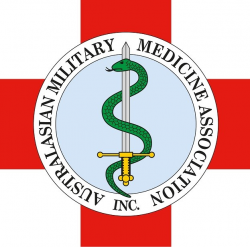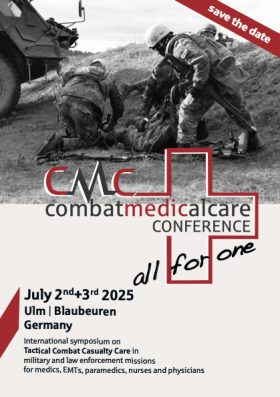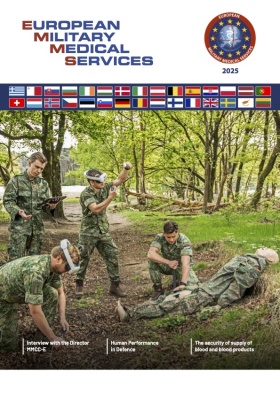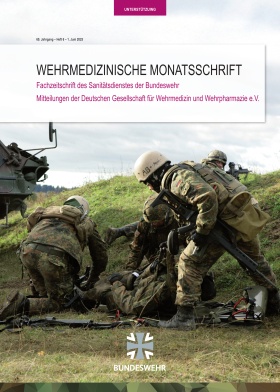
Interview: Martin Bricknell
The NATO response to the COVID-19 pandemic – Interview with Brigadier Stefan Kowitz
This is one of a series of interviews conducted by the Editor-in-Chief with key medical leaders within the NATO health system to record their experiences and insights from the COVID-19 crisis.
Date: 22/09/2021
Interviewer: Lt Gen (Rtd) Prof. Martin Bricknell, Editor-in-Chief, military-medicine.com
Interviwee: Brigadier Stefan Kowitz, Director, NATO Multi-National Coordination Centre/European Union Medical Command
This interview complements the articles written by BG Kowitz ‘On track towards FOC’, which reviews developments in the MNCC/EMC (at: https://military-medicine.com/article/4164-on-track-towards-foc.html), and ‘The 7th domain of warfare’, which provides some initial observations on the COVID-19 pandemic (at: https://military-medicine.com/article/4136-the-7th-domain-of-warfare.html).
Bricknell, Martin:
What is your current role?
BG Kowitz:
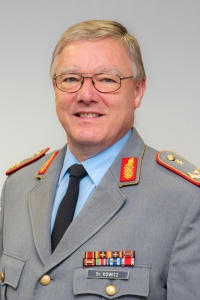
During the COVID pandemic, the current role of MMCC/EMC has been to use lessons identified for its future work to support military medical collaboration and coordination across our participating nations, NATO and the EU.
Our Telehealth Workshop in May 2021 is an excellent example. Telehealth has been a game-changer during the COVID pandemic, and the use of telehealth has increased in different areas of medical support. Telehealth provides significant means to measure the health of our soldiers and to improve the outcome of their medical treatment. COVID has been a trigger for transformation in telemedicine and telehealth. A follow-on Biosensor and Telehealth Workshop is planned in June 2022
We have just finalised an overview of COVID vaccination policies. The most notable finding is that most nations have not made COVID vaccination compulsory for members of the armed forces (as of Sep 2021). This may be hampering the success of vaccination programmes and reducing benefits for this population of risk. However, the vaccines’ success in preventing COVID infection and their limited side effects may change the situation, until a new variant of the virus appears.
MMCC/EMC is increasing its work in civil-military cooperation for the evacuation of patients in large-scale emergencies and in crises, including a higher number of infectious patients. We are working in close cooperation with the NATO Joint Healthcare Working Group and other participating nations on this issue. A workshop on this topic with participants of the responsible civilian and military stakeholders is planned in June 2022.
The MMCC/EMC was able to gain initial experience in stockpiling concepts in April 2020, when it was asked by the Euro-Atlantic Disaster Response Coordination Centre (EADRCC) of NATO to develop a medical stockpiling concept for the NATO COVID Trust Fund. An important part of the concept is a calculator that can be used to compute costs, storage space, and required personnel for each module. The NATO COVID Trust Fund has provided many donations based on this concept.
Based on these experiences, the MMCC/EMC has extended this medical stockpiling concept to the Military Modular Multipurpose Epidemic/Pandemic Stockpiling (M3-EPS) Concept, which can be used by EU and NATO nations and medical stakeholders. As a surge capacity, rapidly deployable and modular standard packages of medical materiel have been identified and defined for stockpiling. The seven modular standard packages, such as support for intensive care units, can be used to support both military and civilian medical facilities. For example, the bilateral support that the Bundeswehr Medical Service provided to Portugal was based on the principles of M3-EPS and included an ICU capability to enhance a civilian hospital. The French medical services use a similar approach. We hope to bring these results into NATO standardisation work and into national developments. We also aim to increase our preparedness with regard to the stockpiling of CBRN chemical and radiation antidotes.
If the MMCC/EMC has the time and resources, it will develop technical guidelines - based on existing NATO STANAGS - for deployed outbreak investigation team, which can be used for both infectious diseases and CBRN agents. We would like to combine deployable medical CBRN capabilities and public health capabilities. Civil-military collaboration regarding reachback laboratories with their sophisticated diagnostic capabilities has to be included in this concept.
Bricknell, Martin:
What do you think have been the contributions of military medical services towards the response to the pandemic?
BG Kowitz:
I would say many nations at first used military and special medical services in different ways. Because of the different constitutions and the different situations and challenges in the various countries, you cannot easily compare military support during the COVID crisis. In the end, if civilian resources were not sufficient, many countries used the military as a last resort for the movement of patients and the provision of personnel and material for hospitals and nursing homes. The military also supported civilian diagnostic and testing systems and vaccination efforts with vaccination teams and centres.
Bricknell, Martin:
And what do you think are the lessons of the pandemic for military medical services?
BG Kowitz:
I think that cooperation and coordination in the multinational environment is important in an epidemic or pandemic environment. At the beginning of this pandemic, all nations were introspective due to the threat and the lack of information about the virus. It is understandable that governments gave priority to national interests. Later, however, we recognised the value of cooperation and burden sharing. I hope we will remember this in the future. In sum, I believe we need open borders, open thinking and interconnected people.
We were warned by the experience of the Ebola crisis in 2014-2016. The risk of a pandemic like the COVID pandemic was known, but the possibility that it would happen was underestimated. I think this is something we must look at in future.
When it comes to the capability development of the military health care system, we need the required resources so that we have increased sustainability and preparedness for such an epidemic/pandemic situation. This means, for example, developing intelligent stockpiling concepts and capabilities.
My hope is that we can live in future with the COVID virus like we do with other viruses such as influenza. We should be able to have regular vaccinations and return to normal life.
Bricknell, Martin:
What do you think are the lessons for international military alliances like NATO and the EU?
BG Kowitz:
As stated in the EU-NATO Joint Declaration (Warsaw, 8 July 2016), “our security is interconnected and together a broad range of tools can be mobilised to respond to the challenges we currently face, and make most efficient use of scarce resources. A stronger NATO and a stronger EU are mutually reinforcing. Together they can better provide security in Europe and beyond.” The leadership of NATO and the EU has requested the cooperation of both organisations. NATO-EU cooperation will prevent a duplication of efforts and offers a greater economy of scales in a resource-strained environment. The medical community can be with the MMCC/EMC at the forefront of NATO-EU cooperation. The medical challenges, now and in the future, are requesting coordination and the efficient use of our limited resources.
Bricknell, Martin:
Do you think there are any risks to military medical services arising from the pandemic?
BG Kowitz:
As a result of the possible COVID-19 global economic recession, the main risk is inadequate financial resources for the armed forces and their medical services. Within the armed forces, we have to emphasise how important the support of our military medical services has been during the response to this crisis.
Bricknell, Martin:
The final question is: what do you think are the specific implications from the pandemic for the COMEDS community?
BG Kowitz:
Video teleconferences (VTC) are a good tool for saving money and travel time. Nevertheless, I think we have lost partly the personal connection. When I see the exchange of information during video teleconferences, I often miss discussions that are more active. However, everyone is still learning to act in such an environment. As most VTC systems allow only information to be exchanged, which is open to the public, the exchange of classified information is not possible.
Date: 01/18/2022
Source: Martin Bricknell


